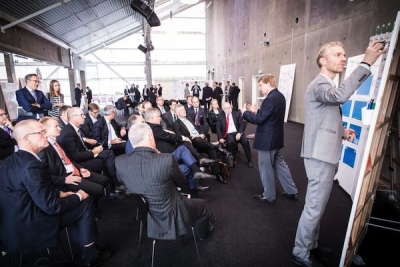The Danish Maritime Forum wrestles with turning thought into leadership

Much of my Wednesday and Thursday this week was spent out at a distant cruise terminal in Copenhagen at the Danish Maritime Forum, the centre-piece of the Danish Maritime Days shipping week.
In its second year the forum is an event that has deliberately set to do something a bit different with a vision to being a Davos of shipping - an idea seemingly driven by the forceful personality of shipping industry veteran Flemming Jacobs, who is also ever present in the background of the event.
It is in a certain sense a slightly hard event to get a hang on. Highly stage managed keynotes are interspersed with closed door working groups, and there are the occasional real sit up take notice moments such as former BBC news presenter Nik Gowing’s speech on the social media, and how it can impact the shipping industry in a crisis.
What is clear is that the forum is seeking to take the high ground in that much sought after position these days of being a “thought leader”.
Both talking to attendees across the two days and listening to the closing plenary, the forum now its second year, of an initial three-year funding, is struggling as to how to take the results of those two days of thought leadership and transfer them into real concrete action.
The first forum in 2014 produced plenty of good sound bites, some nice squiggly graphics and very a glossy publication. But when it came to concrete results the best Danish Shipowners Association ceo and director-general Anne Steffensen could come up with when quizzed at a pre-2015 event media briefing, was tp flag-up the issue of the smart regulation, which she also admitted was already on the international agenda anyway.
At the closing plenary of the forum it was clear this issue of turning talk into reality was high on people’s minds. Long time Maersk man, and DSA chairman Claus Hemmingsen said: “What we now have to figure out is how do we get something out of this, as its now in the second year.”
Obviously as a man with very much a vested interest in making things work he added, “I have committed to my part in DSA and International Chamber of Shipping and in Maersk to make some of these things happen. You have to take it back to where you can make a difference.”
Also on the closing plenary panel, Citi’s head of global head of shipping, Michael Parker, who clearly believes in the concept of the event commented: “We’ve got to do something between now and next year. There has to be something that works from these issues.”
Randy Chen, from Wan Hai Lines, highlighted what he described as the “elephant in the room”, although in reality was more the absolute opposite – the people who were not there. Chen, from Taiwan, noted the relative lack of Asian representation. And he could also have well chosen the world’s largest shipowning nation of Greece.
Danish Maritime Days and the forum have one year left of three years of initial funding, how and if it can move from being simply a high-powered talking shop to a real driver for change is an interesting question.
Despite its lofty ambitions it is still currently a very much a Danish event, funded by companies and institutions in Denmark. The idea postulated of taking it international is a very interesting one that might help make its goals more tangible, but can that really work in the highly global, yet very nationalistic world of shipping?
HEADLINES
- Do shipping markets want Biden or Trump for the win?
- All 18 crew safe after fire on Japanese-owned tanker off Singapore
- Singapore launching $44m co-investment initiative for maritime tech start-ups
- Cosco debuts Global Shipping Industry Chain Cooperation Initiative
- US warns of more shipping sanctions
- China continues seaport consolidation as Dalian offer goes unconditional